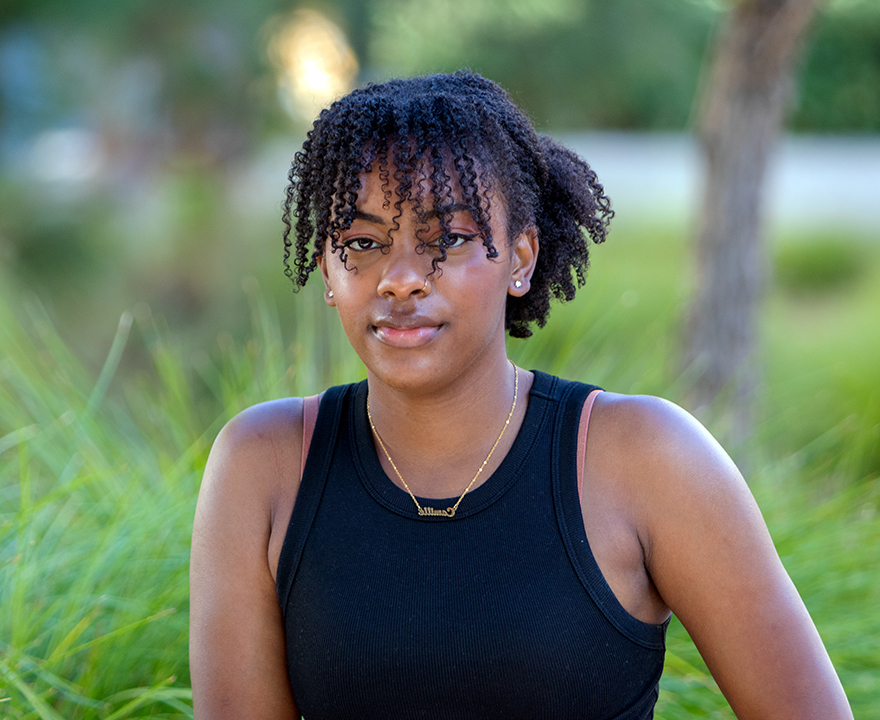Samuels receives fellowship from National Science Foundation to study food system inequities

Samuels receives fellowship from National Science Foundation to study food system inequities
- July 19, 2022
- Competitive Graduate Research Fellowship Program provides three years of full financial support
-----
Camille Samuels, UCI anthropology graduate student, has received a National Science Foundation Graduate Research Fellowship Program grant to support her research on racialized inequities in the food system, particularly among Black populations in Washington, D.C. and Los Angeles. The competitive fellowship includes three years of full financial support. Below, Samuels – a ’21 Haverford College alumna – shares more about her work and pathway to UCI.
Tell us about your research and the work you'll be pursuing with the award.
My research looks at how Black folks in DC and LA navigate food apartheid – which is racialized, state-sanctioned, and structurally determined inequities in the food system -- in our everyday lives. I look at urban agriculture and Black-led food justice projects especially to understand how we create and participate in alternative food systems. I analyze how these systems feed and provide care for the health and wellbeing of our communities and how these forms of mutual aid embody an abolitionist ethos. As a pre-doctoral fellowship, the GRFP funding will provide support in developing an engaging and rigorous dissertation project. I will have the space to take more courses over the next couple of years and can dedicate more time to preliminary fieldwork across both my field sites.
What problem do you hope your findings will help solve?
I hope that my research findings will play even a small role in addressing food apartheid. Whether that is through providing support for community organizing/mutual aid or creating policy suggestions, I aim to use my privileges as a Black woman in academia to provide material resources to people I’m in community with. I hope that my research will also just serve as an inspiration for more Black people to get really excited about food and food justice! When procuring healthy and culturally relevant food is no longer a burden, there is so much fun to be had in the production and consumption of new meals. Everyone eats and everyone deserves to experience wellness and pleasure through the meals they consume.
What made you decide to pursue anthropology as a field of study, and specifically at UCI? What interests you most about your work?
While an undergrad I pursued an interdisciplinary major focused on public health, but I found the courses and instructors who really drew my attention were trained in anthropology. I had very strong undergraduate mentors who taught me that it is possible – and imperative - to ask questions about Blackness, health, and the environment from an anthropological lens. Ultimately, I was drawn to the methods used in anthropology more than any other discipline I was exposed to. I found ethnography, auto-ethnography, and participant observation to be useful tools to understand how my actions, and those of the communities surrounding me, are shaped by societal structures we’re forced to navigate, and importantly that those oppressive structures do not define Black life/living. It allows me to take lived experiences seriously as data for my research and to be directly involved with community projects that I find meaningful.
Who are your faculty mentors? What impact have they had on your academic career?
Here at UCI, I work with anthropology professors Damien Sojoyner and Valerie Olson. In my first year, they have been critical in helping me to push my thinking while imagining new directions that my project can take. They have encouraged and supported me in pursuing interdisciplinary and community-engaged research inside the classroom and beyond. They also happen to be some of the best cheerleaders a Ph.D. student could ask for! It is important to me that I feel supported as a whole person, not just as a producer of knowledge, and both of my advisors bring that care to their mentorship first and foremost.
What unique life experiences have guided your educational journey, and what else would you like to share about your experience in the program here at UCI?
I generally draw on my experience as a Black woman living and navigating life in the white supremacist hetero-patriarchal society we live in. Because I’ve experienced many of these things firsthand, I try to bring a radical Black feminist and abolitionist ethos into all the work I do. How Black people have learned to survive the violence we are faced with every day never fails to inspire me; my work just highlights the community knowledge that has already been formulated, and is already everyday praxis. I would be remiss not to shout out my cohort mates, each of which are incredible scholars and accomplices in their own right. The care, compassion, and love we show each other every day reminds me that is possible for our research to be a vessel to practice that change we want to see in the world, right now.
-----
Would you like to get more involved with the social sciences? Email us at communications@socsci.uci.edu to connect.
Share on:
Related News Items
- Careet RightDickson receives grant to apply computational cognitive models to language acquisition
- Careet RightI Dig UCI
- Careet RightWhy should you keep a lucky frog in your home, according to feng shui
- Careet RightAttending the National Conference for Black Political Scientists
- Careet RightHerzfeld joins UCI anthropology as Distinguished Visitor in residence for winter quarter


